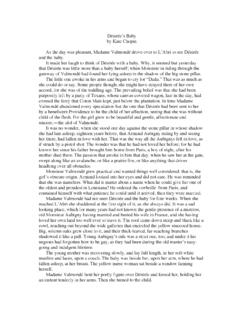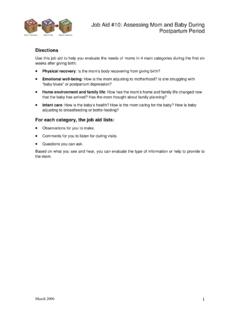Transcription of Altamonte Pediatric Associates Newborn Handout
1 Newborn HandoutGuideline for Infant CareWayne Soven, MD, Harris, MD, Belton, MD, E Candelori, MD, Good, MD, Nguyen, MD, Mullen, Krivan, Powell, Donahue, Goddard, Loft, Vullier, (407) 831-6200 | Springs Office: 475 Osceola Street Suite 1100 Altamonte Springs, FL 32701 Lake Mary Office: 101 N. Country Club Rd. Ste 115 Lake Mary, FL 32746 Apopka Office: 2271 East Semoran , FL 32703 Altamonte Pediatric Associates407-831-6200 | of ContentsI. IntroductionII. First Weeks at home with a Newborn Preventing Fatigue and Exhaustion Postpartum Blues The Father s Role Visitors/Outings Physician Appointments Sleep Position Jaundice Infection Metabolic Problems Respiratory Problems Weight Loss Breast Enlargement and Menses Normal Behavior and Development Feeding Breastfeeding Pumping, Storing, and Handling Breast Milk Formula Feeding Introduction of Solids Vitamins and Fluoride Sterilization Growth ConsiderationIII.
2 Care Tips Bathing Eyes Nose Ears Umbilical Cord Fingernails and Toenails Circumcision Laundry Stools Diaper Rash Face Rashes Hiccups Crying Signs of Illness Facts about Fever Thermometer Use Teething SafetyIV. Developmental MilestonesV. Immunization ScheduleVI. Growth Charts407-831-6200 | Altamonte Pediatric AssociatesOur mission at Altamonte Pediatric Associates is to provide outstanding Pediatric care that is personalized to the needs of our patients. We know that choosing the right pediatrician is an important decision for parents when considering the health and well-being of their child. For this reason, our office is designed for individualized Pediatric care and services. Our staff is committed to the health care of all of our patients.
3 We enjoy working with children and are well trained in healthy childhood growth and development as well as childhood illnesses. We provide patient care services to children of all ages with convenient office hours for families with busy schedules. We are available to you and your family at all times for emergencies. When the office is closed, an answering service will relay all necessary telephone calls to one of our providers. We welcome you to Altamonte Pediatric Associates and look forward to watching your family grow!407-831-6200 | Weeks at home with A NewbornPREVENTING FATIGUE AND EXHAUSTION: For most mothers the first weeks at home with a new baby are often the hardest in their lives. You will probably feel overworked, even overwhelmed. Inadequate sleep will leave you fatigued. Caring for a baby can be a lonely and stressful responsibility.
4 You may wonder if you will ever catch up on your rest or work. The solution to this is to ask for help. No one should be expected to care for a young baby alone. Every baby awakens one or more times per night. The key to avoiding sleep deprivation is to know the total amount of sleep that you need per day and obtain it in bits and pieces. Try going to bed earlier in the evening. When your baby naps it is vital that you nap also. While you are napping, turn off the telephone and place a sign on the door stating MOTHER AND baby SLEEPING. If your total sleep remains inadequate, consider hiring a baby sitter, or asking a relative to help. If you do not take care of yourself, you will not be able to take care of your baby . POSTPARTUM BLUES: More than 50% of women experience postpartum blues on the third or fourth day after delivery.
5 Symptoms may include tearfulness, tiredness, sadness, and difficulty in thinking clearly. This temporary reaction is linked to the sudden decrease of maternal hormones. Since the symptoms commonly begin on the day of discharge from the hospital, the impact of being totally responsible for a dependent Newborn may be a contributing factor as well. Many mothers have the belief that they should be overjoyed about caring for their Newborn , and therefore, feel let down and/ or guilty about experiencing these symptoms. The symptoms usually diminish as hormone levels return to normal (usually within 1 to 3 weeks), and a routine is developed which provides new parents with a sense of control over life. If the symptoms are not better by the time your baby is one month old, you should contact your physician. There are several ways to cope with postpartum blues.
6 See the following suggestions to help you through this difficult time. Acknowledge your feelings and discuss them with your husband and/or a close friend. Do not try to suppress crying, or try to be a super mom . Get adequate rest Get help with housework/childcare Socialize with others - do not allow yourself to become isolated; try to go out at least once a week; go to the hairdresser, visit a friend, go shopping, or see a | FATHER S ROLE: It is important for fathers to take time off of work to be with mom during labor and delivery, as well as when mom and baby first come home from the hospital. Many fathers often feel left out since most of the attention is usually focused on mom and baby . In addition, many fathers are concerned that they may hurt their baby and/or be unable to comfort him/her if he/she cries. However, it is important for fathers to get involved.
7 Not only will this help mom, it will help to develop a close relationship with the baby as well. Below are some suggestions of activities that a father can use to develop a closer, stronger relationship with his baby . Bathe the baby Change the baby s diaper Assist mom with positioning the baby when breastfeeding Feed the baby pumped breast milk or formula once breastfeeding has been established Burp the baby Walk the baby Rock the baby Comfort the baby when fussy Take the baby for a ride in a stroller Play with and talk to the baby Read to the babyVISITORS/OUTINGS: After the much anticipated arrival of your Newborn , many well-meaning friends, family, and neighbors will want to share in your excitement and come by for a visit. As proud new parents, the desire to show off your Newborn is normal, and expected. However, it is best to minimize your Newborn s contact with unnecessary visitors for at least the first month.
8 It is also recommended to avoid unnecessary outings, and exposure to children, with the exception of siblings. Your Newborn s immune system is not equipped to handle all the potential exposure to infectious diseases. Your baby can be taken outdoors; however, sun exposure should be limited to 10 to 15 minutes at a time. It is important to dress your baby with as many layers of clothing as an adult would wear for the outdoor temperature. The most common mistake is overdressing in the warm Florida weather. Overdressing can cause sweating, and an irritating heat rash. In the winter, the baby will need a hat to prevent heat | APPOINTMENTS: Your baby will have a series of scheduled well child visits. The first visit will be a few days after you leave the hospital, 2 weeks, 2 months, months, 5 months, months, 9 months, 12 months, 15 months, 18 months, 24 months, 30 months, 3 years, and then yearly thereafter.
9 The physician will perform a complete physical evaluation on the baby and appropriate immunizations will be is necessary to schedule a routine Newborn exam in the office within 48 hours of discharge from the hospital. The baby will have a full evaluation by the physician. Screening for jaundice, appropriate weight maintenance/gain, voiding and stool patterns, and overall health will be reviewed. The two week exam is probably one of the most important visits for your baby during the first year of life. Symptoms of any possible physical conditions that were not present during the hospital stay will usually develop by this POSITION: The American Academy of Pediatrics recommends placing your baby in a crib with a firm mattress on his/her back. This reduces the risk of Sudden Infant Death Syndrome (SIDS). To avoid potential smothering unnecessary toys, blankets, and stuffed animals should not be placed in the crib.
10 JAUNDICE: Some degree of yellow jaundice is common and normal for your Newborn , especially if breastfeeding. If it becomes significant, your baby may need to be treated with special light therapy. At times we have to supplement a jaundiced baby for better hydration. Jaundice (bilirubin) levels may need to be performed on your infant, which requires a simple heel stick to collect a small amount of blood to determine what intervention, if any, needs to take place. INFECTION: Your infant may need to be observed closely for signs of infection if you have been ill near the time of delivery, or if your water broke, or leaked for an extended period of time. If necessary, your baby may need to be kept in the hospital for evaluation and treatment. METABOLIC PROBLEMS: Occasionally, infants may have problems with the level of blood sugar, calcium, etc.




